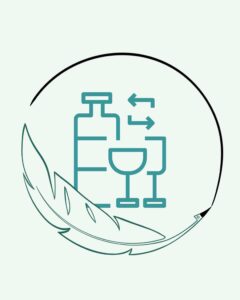Biodegradation is the process by which organic materials are naturally broken down by microorganisms or other living organisms in nature to convert them into simpler components and mix with the soil. This process is defined as the environmental conversion of plant and animal remains, food waste and other organic matter.
Biodegradation; It is an important natural degradation process for the healthy functioning of ecosystems and the sustainability of nutrient cycles.
The biodegradation process is usually carried out by the activities of microorganisms such as bacteria and fungi. These organisms break down organic matter into simpler components by breaking it down using enzymes. For example, biological processes such as decomposition of organic wastes, composting, increasing soil fertility and maintaining environmental balance are associated with biodegradation.
Biodegradation plays an important role in reducing environmental pollution by ensuring the balanced elimination of organic wastes accumulated in nature and recycling of nutrients back to the environment. It also plays an important role in applications such as biofuels and bioenergy. Therefore, biodegradation is a critical process for the sustainability of the natural environment and the health of ecosystems.
Biodegradation has various sub-titles;
Soil Biodegradation
It is the breakdown and transformation of organic matter by microorganisms in the soil. Plant and animal remains increase the organic matter content of the soil and ensure the fertility of the soil. Thus, it provides nutrients for plants and maintains nutrient cycles.
Water Biodegradation
It is the process by which microorganisms living in water break down organic matter. This type of biodegradation contributes to the natural removal of organic waste, especially in aquatic ecosystems.
Marine Biodegradation
It is the degradation of marine organic materials by microorganisms found in the marine environment. Marine biodegradation ensures the balanced recycling of organic materials into the environment in marine ecosystems.
Biodegradation in Air
It is the process of decomposition of microorganisms in the air, especially organic gases in the atmosphere. This process can affect air quality by controlling the concentration of organic substances in the atmosphere.
Composting
It is the conversion of organic wastes, especially those of plant origin, into soil-improving compost material by being broken down by microorganisms in a controlled environment. It is widely used for composting, recycling of garden waste and increasing soil fertility.
Animal and Plant Tissue Degradation
It is the breakdown of animal and plant tissue residues by natural processes. This process helps to recycle in nature the leaves, tree stumps, and dead animals that have fallen from the forests to the valley floors.
Denitrification
It is a process in the nitrogen cycle and involves bacteria converting nitrate to nitrogen gas. This is a type of biodegradation that balances the excess nitrate in soils. It includes different aspects of biodegradation and recycling processes of organic materials in the natural environment.
These processes are important for environmental health and sustainability by ensuring that natural ecosystems function in a balanced way and organic wastes are eliminated without harming nature. In fact, raw materials that exist naturally in nature, that is, organic fibers, have the feature of natural degradation. For example, organic-based raw materials such as organic cotton, banana fiber, and fibers produced from pineapple have the ability to degrade in nature. At this point, the point to be considered is not to use raw materials that are already degradable in nature as a mixture. In other words, when an organic raw material is mixed with a synthetic raw material, the degradation processes should be reviewed.
Many companies can use synthetic and organic raw materials together because of the high costs of organic raw materials, advocating a certain level of sustainability, and considering that they increase fiber strength. These processes should be reviewed.
However, what I want to explain here is that various products that do not have the feature of decomposition in nature and that have settled in our daily life, including plastics, can be degraded by using starch-derived raw materials. Plastics that can degrade in nature are called ‘bioplastics’. Bioplastics have started to be used in disposable packaging today.







